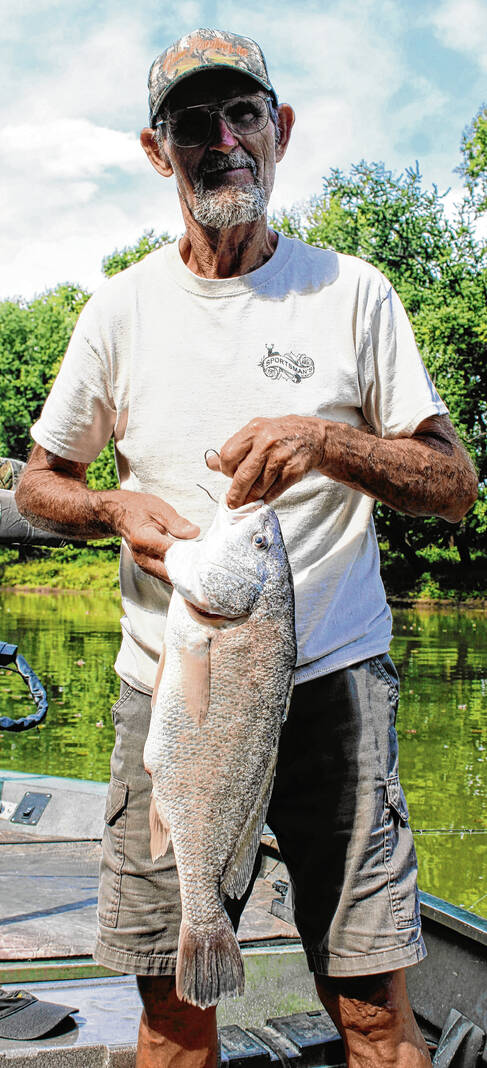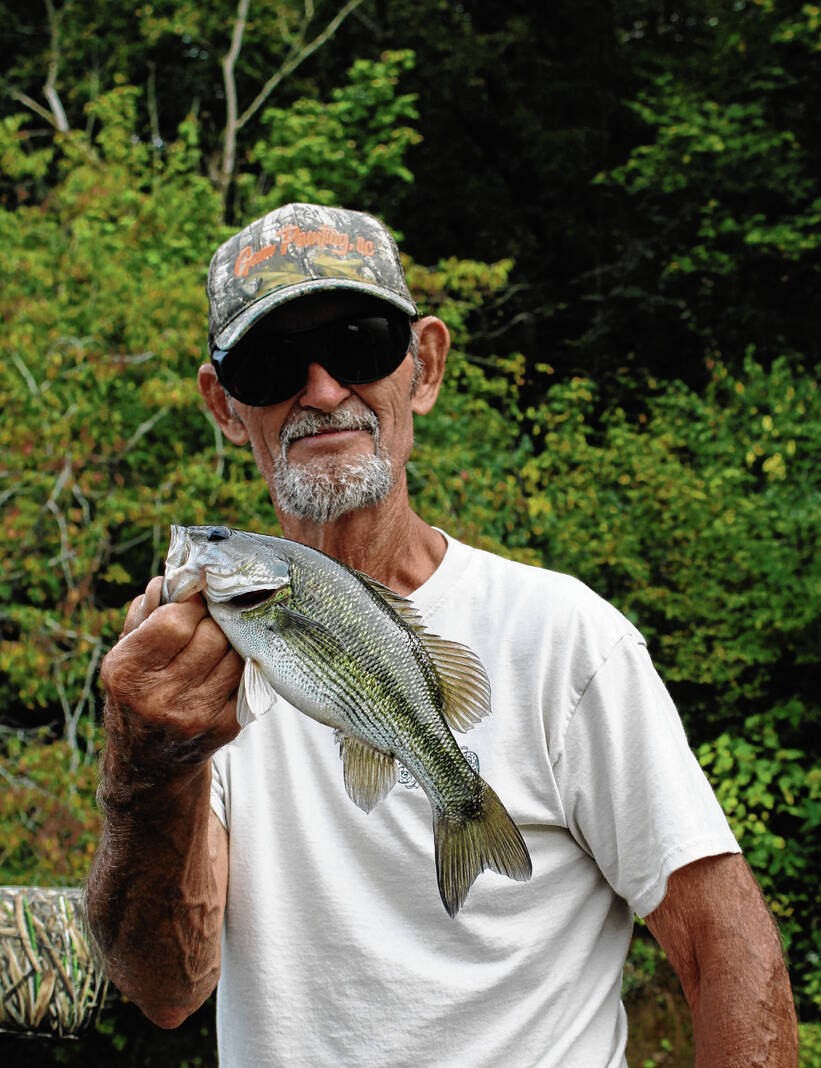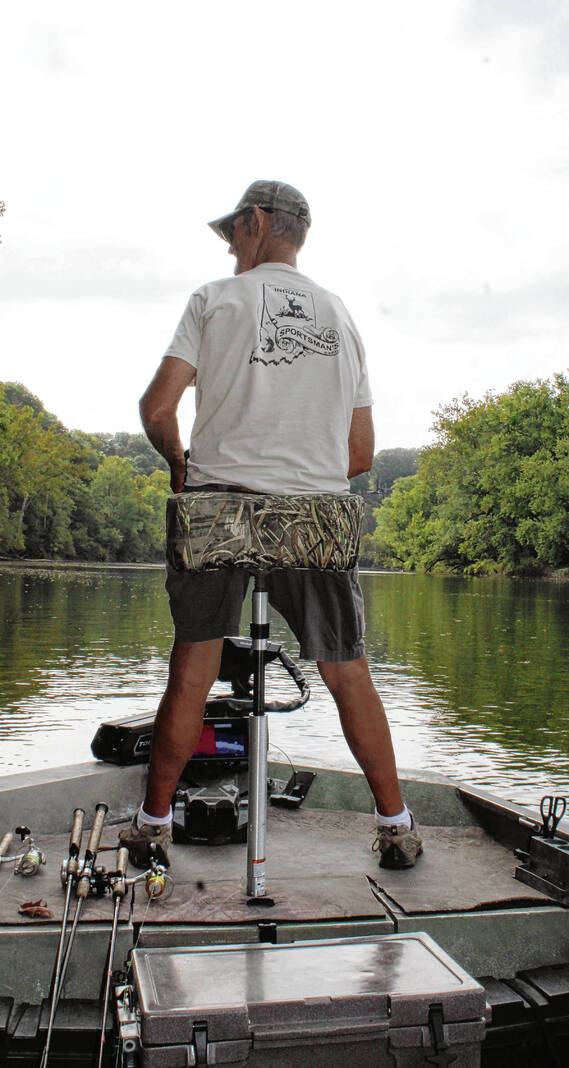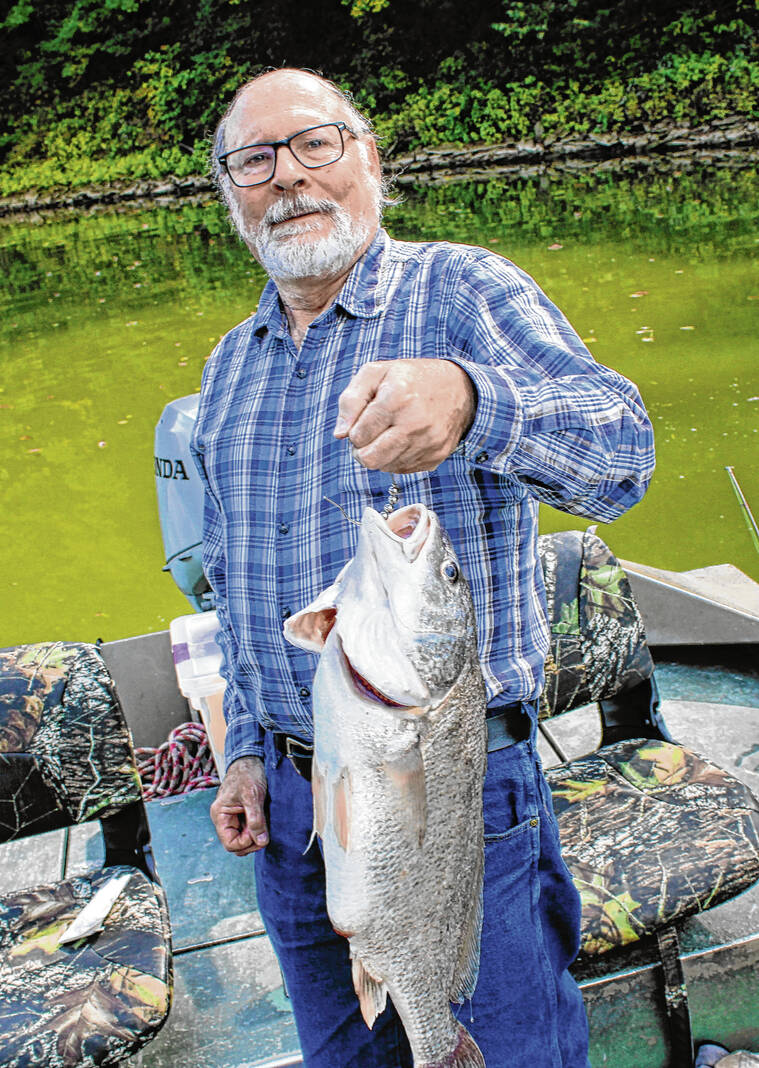
Guide Tom Todd holds up a large freshwater drum caught by Lew Freedman on the East Fork of the White River.
Lew Freedman | The Tribune

Tom Todd displays a Kentucky bass he caught on the White River.
Lew Freedman | The Tribune

Lew Freedman holding up a fish caught on the White River.
Lew Freedman | The Tribune

Tom Todd of Tom’s Guide Service fishing on the White River.
Lew Freedman | The Tribune

A quiet day of fishing on the East Fork of the White River with hardly anyone sharing the water.
Lew Freedman | The Tribune

Lew Freedman holds up the large “mystery” fish that turned out to be a freshwater drum.
Lew Freedman | The Tribune
WILLIAMS — The October day was a mix of the beautiful and the sublime, the ridiculous and the goofy, marvelous fishing and of course the big one that got away.
It would be impossible to not live that stereotype when auditioning for a belated place in a Patrick McManus story, too late by a period of years because dear Patrick is late. But, grabbing one of his many collections of outdoor humor columns can still make you laugh from the grave he has inhabited since 2018.
Tom Todd and I were after live ones on the East Fork White River, pushing into the steadily moving water with his 18-foot aluminum-hulled motor-propelled boat from a public access ramp in Williams.
“There’s a lot of fish,” said Todd, proprietor of Tom’s Guide Service out of Bedford, an area he has lived in most of his 70 years. “We’ll catch them.”
Those are words you like to hear a guide utter. And even more so, a phrase you would like to believe. Still, for those intimate with my fishing history, I have been wooed by such promises before only to be embarrassingly skunked. So, seeing is believing.
In recent years, however, I had fished with Todd at Monroe Lake and Patoka Lake, two of his other specialty bodies of water, and I had no reason to doubt this claim because we did catch fish elsewhere.
“I fished this river when I was a little, bitty kid,” Todd said.
Why would he keep coming back if there was not an abundance of fish? It was all about the sport of the angling for me, since I planned to release every fish that sacrificed itself on my hook.
Except, of course, carp. Whole different animal carp. Carp are an invasive species and you are not supposed to throw them back in the water to do additional damage. You are supposed to conk them on the head with a conker, or a Louisville Slugger baseball bat, as Todd sometimes carries.
The sneaky critters can be subdivided as silver carp, black carp, big-head carp and grass carp, but for our purposes, they were lumped together as just carp. They were full of bad intentions in terms of inhaling otherwise productive river bottom nutrition. And they were good at taunting fishermen, too, leaping a couple of feet out of the air and making a big splash to startle them.
Except as a curiosity, our main objective was to ignore the carp and let them play their water sports.
The weather could not have been more hospitable. Sunny, temperature on the rise to 80 degrees, no humidity. There was no fishing competition, either. We crossed paths with just one other angler over six hours. Mostly, it was the old men and the sea. Us.
“I love it that way,” Todd said. “Last time I was out here I never saw a soul.”
We were out on a weekday, so everyone else was either working or in school, I guessed.
An Olympic high-jumping carp welcomed us to the river, skying high and making quite the splash on re-entry. On a previous White River visit, one of those creatures jumped directly into Todd’s boat and rolled around on the floor, creating quite a commotion and sliming the whole operation. It took some cleaning to rid the bottom of the gook and smell of the fish.
Carp generally do not bite on Todd’s lures and they are strong enough to break off 10-pound test line used to catch Kentucky bass and bluegill, which can congregate a short distance from the ramp, and even to snap the 20-pound test Todd prefers for white perch.
“There are thousands of them, but very seldom do they bite,” he said. “Mostly, you pass over them. Last time I was out, one broke a 20-pound test line.” Showoff.
I remember when living in Chicago and Asian carp began invading the Illinois River. They were a plague and dangerous to fishermen. So many carp appeared and jumped so high, people took to carrying metal garbage can lids as shields while steering the waters. It was made clear a leaping carp that hit you in the head could knock you cold, with the prospect of the human falling overboard and drowning.
Indiana’s invasion can be blamed on the importation of carp in the 1960s and 1970s to clean agricultural ponds, said Department of Natural Resources biologist Craig Jansen.
“They escaped the ponds,” Jansen said.
Then they spread through the Mississippi River basin.
“The White River and the Wabash River are pretty productive for them,” Jansen said. “There’s a lot of food available. They jump and they out-compete other fish.” The silver carp may weigh 25 to 30 pounds. “Man,” he said, “I wouldn’t want to get hit by one of them.”
As Todd and I cruised the river I kept my ears peeled for splashing carp, but rarely saw more than the after-effects of their dive back into the water. I wanted to see them up close, but did not want to be someone who got conked.
We cast near shore, the lures making small plunking sounds when they broke the plane of the water. They rarely made much of a sound being reeled back, however, because not many fish were biting.
Todd reeled in a Kentucky bass. So did I. Then he brought in a bluegill. There were wet-your-appetite fish, just several inches long and in diameter. We were so close to shore at one point items falling from trees made plopping sounds as they hit the surface. The trees were bombing us with acorns. After about an-hour-and-a-half it had to be admitted the fish were winning and we moved on.
Todd had his favorite recommended spots and we settled in to troll for white perch. Didn’t take long before the bites began. The fish hit hard and bent rods when swallowing a hook.
These aggressive fish wanted to eat and we aimed to please, or at least aimed to provide a bait and switch. Chomp, reel, bring the fish to the boat. We caught three-to-four-pounders who kept wiggling in the net, then posed for pictures before release. The fish were tough and spirited fish and fought well.
Then came a real fight, the Joe Frazier or Mike Tyson version of combat, not some lighter weight class fish. I pulled and he pulled. I reeled and he strained. I reeled some more and he came in steadily to the boat where after some minutes Todd netted him.
This was a whopper. The fish must have been 20 inches long weighing 10 pounds, a big dude. Although Todd said it was a white perch, when I later looked for a description of white perch I learned they didn’t grow that big.
This made me wonder if I caught a world-record mystery fish. That would be perfectly consistent with my fishing history, catching something that was worthwhile, but unidentifiable. We knew it was no carp. It definitely was no catfish. Ultimately, citing outside sources, it was determined to be a freshwater drum.
This fish conformed to the name of one of McManus’ books collecting magazine works: “Never Sniff A Gift Fish.” Dialogue in the piece of that name featured the protagonists trying to invent an all-time memorable outdoor quotation. As for “never sniff a gift fish,” the author’s friend Finley says, “That means you shouldn’t be too critical of something that’s given to you.” I wasn’t.
Not 10 minutes later the rod doubled. A bigger fish, stronger, with a tougher jaw pulled. I reeled and he battled back. Then, after a few minutes, he spit the hook. Never got a glimpse of him. Was it a carp? Was it an even bigger mystery fish? So, the big one got away.
After that our fishing devolved into a comedy of mishaps. My line drifted behind the boat and I realized I was tied up with the motor. As I brought this to Todd’s attention he realized, somehow, from the other side of the boat, his line had also drifted and tangled with the motor. We had paralyzed the motor.
We were good and tied up and Todd needed pliers to begin freeing the motor from our dental floss. He crawled over the rear of the boat and leaned over. I retreated to the front and sat down heavily. Too heavily. I misjudged the angle and smashed my tailbone on the hard surface, banging it so hard I could barely stand.
While I groaned, Todd spent a half-hour freeing lines without ruining anything or losing either lure. I was certain he was going to plunge overboard as a punch line to our “America’s Funniest Home Video.” But he didn’t.
We eventually fished on, Todd saying, “This is where the big boys live.” Maybe so, but after watching us rope the motor as if it was a rodeo calf, and me tumble inside the boat, the fish sneered at us.
Another sign it might be time to quit was raindrops fell from the sky. Since we were surrounded by sunshine, this seemed peculiar, even impossible, but it was true, at least for a couple of hundred yards of river movement.
We gave the fishing one last try back near the ramp and I snagged the line on a small branch sticking upward. Yet when it was freed, a fish was on. The last catch of the day was a Kentucky bass. The McManus piece imparted more wisdom: “No fisherman ever bragged that the huge fish he hooked turned out to be a log.” I flipped the scenario, the log I hooked turned out to be a fish.
While removing the boat from the White River, Todd stumbled, did a nifty two-step, but stuck the landing as smartly as a gold-medal gymnast. I had just refrained from expressing a thought, “At least no one fell in the water” until the boat was safely on the trailer.
Todd looked at me and said, “That was darned near it.”
More than two weeks later, my tailbone was still bruised.
